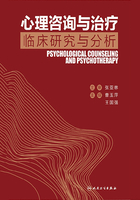
参考文献
1.Cummings NA, Lucchese G. Adoption of a psychological orientation: The role of the inadvertent. Psychotherapy: Theory, Research and Practice, 1978, 15(4):323-328.
2.Dimensions of therapeutic skills and techniques: Empirical identification, therapist correlates, and predictive utility. Psychotherapy: Theory, Research, Practice, Training, 1985, 22(1):63-74.
3.Vasco AB, Garcia-Marques L, Dryden W.“Psychotherapist know thyself!”: Dissonance between metatheoretical and personal values in psychotherapists of different theoretical orientations. Psychotherapy Research, 1993, 3(3):181-207.
4.Vasco AB, Dryden W. The development of psychotherapists′theoretical orientation and clinical practice. British Journal of Guidance and Counselling, 1994, 22(3):327-341.
5.Cornsweet C. Nonspecific factors and theoretical choice. Psychotherapy: Theory, Research and Practice, 1983, 20(3):307-313.
6.Stevens HB, Dinoff BL, Donnenworth EE. Psychotherapy training and theoretical orientation in clinical psychology programs: a national survey. Journal of Clinical Psychology, 1998, 54(1):91-96.
7.Sverre V, Alf G. The development of psychodynamic psychotherapy and psychoanalysis in China. International Journal of Applied Psychoanalytic Studies, 2011, 8(3):261-267.
8.Steiner GL. A survey to identify factors in therapists′selection of a therapeutic orientation. Psychotherapy: Theory, Research and Practice, 1978, 15(4):371-374.
9.Poznanski JJ, McLennan J. Becoming a psychologist with a particular theoretical orientation to counselling practice. Australian Psychologist, 2003, 38(3):223-226.
10.Chwast J. Personality and opportunity in psychotherapist′s choice of theoretical orientation or practice. Psychotherapy: Theory, Research&Practice, 1978, 15(4):375-381.
11.Auerbach AH, Johnson M. Research on the therapist′s level of experience//Gurman AS, Razin AM. Effective psychotherapy: A handbook of research. New York: Pergamon Press, 1977: 84-102.
12.Zakaria M, Asyraf HAR, Wan IWA. Factors affecting theory choice amongst muslim counsellors in malaysia. International Journal of Humanities and Social Science, 2011, 1(14):170-174.
13.Herron WG. The therapist′s choice of a theory of psychotherapy. Psychotherapy: Theory, Research and Practice, 1978, 15(4):396-401.
14.Kazantzis N, Frank PD. Theoretical orientations of New Zealand psychologists: An international comparison. Journal of Psychotherapy Integration, 1998, 8(2):97-113.
15.Gelso CJ. Emerging and continuing trends in psychotherapy: views from an editor′s eye. Psychotherapy(Chic), 2011, 48(2):182-187.
16.Li M, Duan C, Ding B, et al. Psychotherapy integration in modern China. Journal of Psychotherapy Practice and Research, 1994, 3: 277-283.
17.McAleavey AA, Castonguay LG, Xiao H. Therapist orientation, supervisor match, and therapeutic interventions: Implications for session quality in a psychotherapy training PRN. Counselling&Psychotherapy Research, 2014, 14(3):192-200.
18.Tasca GA, Sylvestre J, Balfour L, et al. What clinicians want: findings from a psychotherapy practice research network survey. Psychotherapy, 2015, 52(1):1-11.
19.Zarbo C, Tasca GA, Cattafi F, et al. Integrative Psychotherapy Works. Frontiers in Psychology. Publish online, 2016, 6: 2021. [2017-12-07] https://www.ncbi.nlm.nih.gov/pmc/articles/PMC4707273/pdf/fpsyg-06-02021.pdf. DOI: 10.3389/fpsyg.2015.02021.
20.Suszek H, Grzesiuk L, Styla R, et al. General Overview of Psychotherapeutic Practice in Poland. Results from a Nationwide Survey. Psychiatric Quarterly, 2017, 88(3):571-584.
21.Schofield MJ, Roedel G. Australian psychotherapists and counsellors: A study of therapists, therapeutic work, and professional development. Melbourne: La Trobe University, 2012.
22.Muller FJ. Psychotherapy in Argentina: theoretical orientation and clinical practice. Journal of Psychotherapy Integration, 2008, 18(4):410-20.
23.付艳芬,黄希庭,尹可丽,等.从心理学文献看我国心理咨询与治疗理论的现状.心理科学,2010,33(2):439-442.
24.茆正洪,赵旭东.«中国心理卫生杂志»心理咨询与治疗类文献(2000-2009年)的综合分析.中国心理卫生杂志,2011,25(4):254-258.
25.周婧.社会上的心理咨询服务现状与对策研究.重庆:西南大学,2010.
26.董彦皓.中国传统心理治疗思想特色的研究.长沙:湖南师范大学,2004.